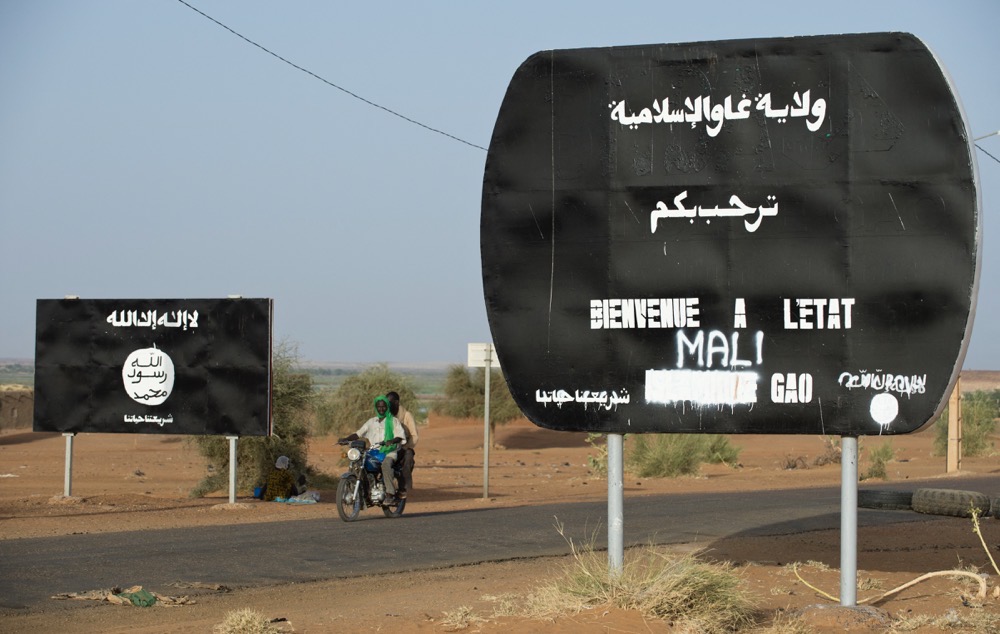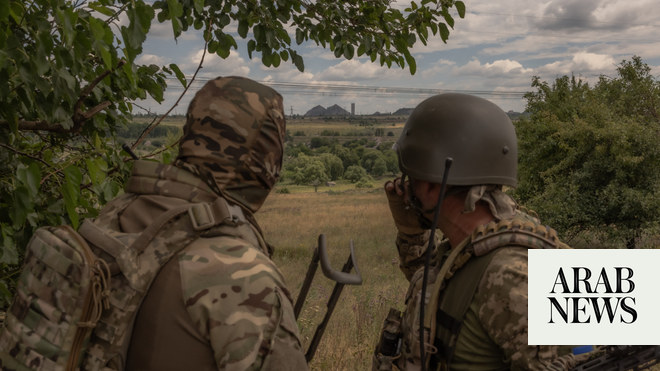NDJAMENA, Chad: A senior UN official issued a stark warning earlier this month that terrorism and organized crime perpetrated by extremist groups linked to al-Qaeda and ISIS were escalating into a widespread threat across West Africa and the Sahel region.
The threat is spreading to coastal West Africa, showing that the world may be waking up too late to the looming crisis.
A statement by Leonardo Simao, the United Nations Special Representative for the Sahel and West Africa, highlighted the increase in illicit trade in drugs, arms, mineral resources, people and even food.
In the first half of 2024 alone, hundreds of people were killed in terrorist attacks, reflecting a sharp increase in violence.

Members of the military delegation arrive at the Malian Defence Ministry in Bamako, Mali. (AFP)
Such developments highlight the complexity and multiplicity of this challenge. The interconnectedness of terrorism and organised criminal networks creates an insecure environment where insecurity is the norm.
“This instability is also of great importance to the international community. As extremist groups become more aggressive, the humanitarian, economic and political impacts threaten to spread far beyond the borders of Africa,” Chadian security expert Mustafa Saleh told Arab News.
The situation has been exacerbated by recent political turmoil. The G5 Sahel, a French-backed coalition that was meant to coordinate security and development in West Africa, collapsed last year after military-ruled Mali, Niger and Burkina Faso withdrew.
This has prompted the United States and other Western nations to come to the aid of Ghana and its West African neighbors to bolster their defenses. Although Ghana has yet to face direct armed violence, Togo, Benin and Ivory Coast have experienced attacks near their borders in recent years, highlighting the growing threat of instability in the region.
However, aid to West Africa remains short compared to aid given to Ukraine, Ghanaian President Nana Addo Dankwa Akufo-Addo said in a recent interview.
US aid to Ukraine since the Russian invasion has risen to $113 billion. In contrast, joint aid from the European Union, the United Kingdom and the United States to the Economic Community of West African States, or ECOWAS, amounted to just $29.6 million over the same period.

The operation in Menaka, Mali, in 2020 aimed to reduce the number of weapons in circulation. (AFP)
“Military regimes often struggle with legitimacy and resources, lacking the tools needed to tackle the complex and well-funded operations of extremist groups. The lack of international military support leaves these countries vulnerable, and the consequences are getting worse,” Saleh said.
The sudden change has opened the floodgates for radicalization as these countries struggle to fill security gaps created by the withdrawal of foreign troops.
Many Sahel countries are now turning away from the West in search of allies to bolster their defenses. The Russian mercenary group Wagner has reportedly sent contractors and military equipment to several West African countries, including Mali and Burkina Faso, over the past two years.
This escalating crisis has claimed many lives. In the first six months of 2024, hundreds of civilians were killed by terrorist attacks, communities were torn apart and people were displaced from their homes on an unprecedented scale. Refugee camps have proliferated as people flee the violence, creating an urgent need for humanitarian assistance.
Human trafficking is also becoming a major problem, with vulnerable populations being exploited, sold into slavery or forced to join terrorist groups. Illegal immigration from West African countries to Europe via regular migration routes is on the rise.

The cars were allegedly set on fire by members of the Islamic State West Africa Province (ISWAP) group. (AFP)
Meanwhile, drug and arms trafficking not only fund extremist activities but also fuel further violence, creating a vicious cycle of instability.
The economic impact is equally devastating. The booming illicit trade in mineral resources, including gold, diamonds and other valuable commodities, is costing countries vital revenues. Instead of using them to develop infrastructure, these resources are being used for terrorism and crime.
The disruption of legal trade routes due to insecurity has crippled local economies, with farmers and traders finding it harder to transport goods, leading to food shortages and soaring prices.
“Overall economic instability has reduced foreign investment and hindered development, deepening poverty and disenfranchisement,” Saleh said.
Until last year, global support for counter-terrorism in the Sahel region had been enormous, with a variety of countries and organizations stepping in to help. The United States played a key role, with drone bases in Niger and Burkina Faso and around 1,000 troops in the region.

The army seized power in Mali on August 19, 2020. (AFP)
France has been a prominent supporter through military operations such as Operation Barkane, which was headquartered in Chad and involved around 4,000 personnel at its peak. The operation aimed at securing the region and combating terrorism in cooperation with local forces in Mali, Niger and Chad.
The EU Training Mission and the EU Capacity Building Mission also played a role, until a sudden coup in the region left Western governments unable to continue cooperating militarily with the hostile coup group.
But given the severity of the current crisis, many experts say the world cannot afford to look away. “The international community must realize that the threats from the Sahel and West Africa are not limited to the region, but have global implications,” Zoulay Amalker, a Niger security expert, told Arab News.
innumber
• 361 people were killed in conflict in Niger in the first three months of 2024 (ACLED)
• More than 25.8 million people in Burkina Faso, Mali, Niger and Nigeria will need humanitarian assistance this year.
• There are more than 6.2 million internally displaced people in Burkina Faso, Mali, Niger and Nigeria.
• More than 32.9 million people face food shortages in Burkina Faso, Mali, Niger and Nigeria.
Terrorism and organized crime in these areas could destabilise continents around the world, disrupt global trade and spur massive international migration. “There is also a risk that these extremist ideologies will spread beyond Africa, posing a threat to security in other regions,” Amalker said.
Experts say the spread of extremist ideologies and the emergence of terrorist groups in West Africa will lead to instability that could affect the Arabian Peninsula as well.
They said that Gulf states already supporting counter-terrorism efforts in West Africa would have to adjust their strategies given the recent disbandment of the G5 Sahel.

A motorcyclist drives past a sign welcoming people to the “Islamic State of Gao” which has been translated to read “Welcome to the State of Mali” in Gao, Mali. (AFP)
Experts argue that solving the crisis requires a multi-faceted approach, suggesting they need a combination of current and long-term strategies.
“Immediate action should include reestablishing military cooperation. It is imperative to revive and strengthen military cooperation with international partners, as such cooperation will provide the necessary support to forces on the ground to effectively counter the threat posed by extremist groups,” Lauren Mitchell, a security expert at the Washington-based Institute for Peace, told Arab News.
Humanitarian assistance is also important. Urgent and adequate assistance is needed to support displaced populations and provide basic necessities such as food, water and medical care.
Strengthening border control and international cooperation are also essential to disrupt human trafficking networks, including better intelligence sharing and coordination of law enforcement actions.
Long-term solutions often focus on economic development and support for projects that promote self-reliance.

The army seized power in Mali on August 19, 2020. (AFP)
“This involves building infrastructure, creating jobs and promoting sustainable agricultural practices to ensure food security,” Mitchell said.
Analysts say that providing education and vocational training to young people can help protect them from being recruited by radical groups. Social programs that address poverty and disenfranchisement are important for long-term stability.
They said international efforts should focus on facilitating a transition to a stable, civilian-led administration capable of effectively managing and responding to the needs of its people.

